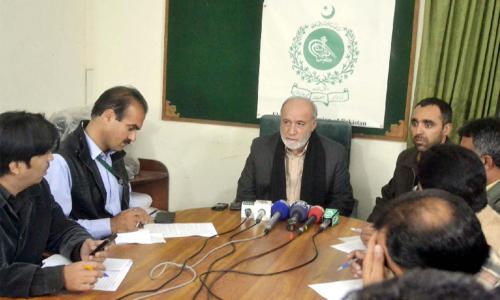QUETTA: The Balochistan government has chalked out a comprehensive security plan to ensure peaceful local government elections in the volatile province.
Local bodies’ elections, scheduled for Saturday Dec 7, appear to be a major challenge for the provincial government in Balochistan, led by nationalist Dr Abdul Malik Baloch.
The May 11 general elections witnessed violent attacks by separatist armed groups in the capital Quetta and other troubled parts of the province.
Asad Gilani, the Secretary Home and Tribal Affairs Department in Balochistan, said 55,000 security personnel including 5,000 personnel of the Pakistan Army would be deployed across the province to make the polls peaceful.
Around 18,000 candidates are testing their muscle to win 4,168 seats.
Baloch, Pashtun nationalists, religious parties and mainstream political parties including the Pakistan Muslim League–Nawaz (PML-N), Pakistan Peoples Party (PPP), Pakistan Tehrik-i-Insaf (PTI) are contesting the elections in 32 districts of the province.
“Despite all odds, the government is determined to hold elections,” said Gilani.
A series of bomb explosions had rocked different parts of Balochistan during the May 11 elections when a limited number of candidates contested for 51 provincial assembly and 11 National Assembly seats.
“Now thousands are in the run for thousands of constituencies,” said Gilani.
Provision of security to voters and candidates in Baloch-dominated areas of the province seem to be a difficult job for the provincial government.
Balochistan has remained under the grip of violence for almost a decade. The situation in the geographically largest province of the country went from bad to worse soon after the killing of Baloch nationalist leader Nawab Akbar Khan Bugti on Aug 26, 2006.
The Baloch Republican Party (BRP) — formed in exile by Bugti’s grandson Brahamdagh — and the Baloch National Movement have already announced a wheel jam and shutter-down strike during the local bodies elections in the province.
Gilani said the total number of seats across the province in the local bodies’ election was 7200.
He said that all candidates in district Kech (Turbat) and the earthquake-affected Awaran district had already been declared elected unopposed.
Baloch insurgents have strongholds in the two volatile districts and have already warned people to stay away from electioneering.
However, the home secretary said: “Electoral process was completed and political parties demonstrated maturity in the two districts to bring their candidates unopposed.”
According to sources in the Balochistan Election Commission, 2,507 candidates were declared unopposed whereas no candidate submitted nomination papers on 513 local bodies’ seats in the province.
“By-elections would be conducted on 513 seats,” Syed Sultan Bayazid told Dawn.com.
The home department has declared nine districts highly sensitive during the polls. The home secretary said 12,381 polling stations have been set up across the province.
“2,776 polling stations have been declared ‘very sensitive’ and 1,581 declared ‘sensitive’ in the province,” Gilani said.
Around 11 personnel of the paramilitary Frontier Corps, police, Balochistan Constabulary and levies would be deployed at each of the ‘very sensitive’ polling station and seven to eight personnel would be deployed at ‘sensitive’ ones.
“The polling stations were declared sensitive based on intelligence reports,” he added.
All political parties are making tooth and nail efforts to secure maximum seats in the local bodies elections. Different political parties have formed alliances to ensure victory.
A ten party alliance, comprising the Balochistan National Party (BNP), Awami National Party (ANP), Jamaat-i-Islami (JI), Ahle Sunnat Wal Jamaat (ASWJ) and other political parties, was formed in Quetta to secure the mayorship of the metropolis.
Similarly, the ruling Pakistan Muslim League – Nawaz (PML-N), National Party (NP) and the Pashtoonkhwa Milli Awami Party (PkMAP) have also fielded their candidates throughout the province.
According to the secretary local government Niaz Kazim, there was one metropolitan corporation, 53 municipal committees, four municipal corporations and 31 district councils across the province.














































Dear visitor, the comments section is undergoing an overhaul and will return soon.